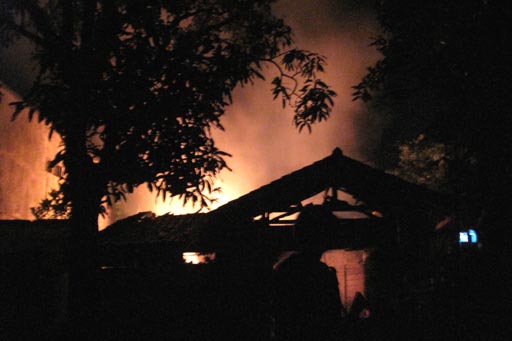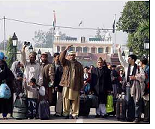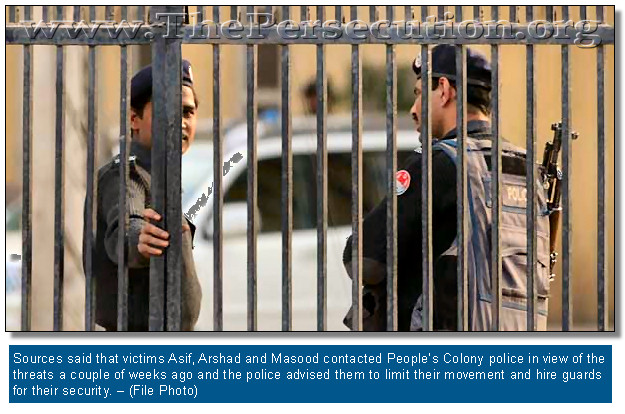News / AHRC News / INDONESIA: Conviction of Ahmadyah victim …
INDONESIA: Conviction of Ahmadyah victim undermines constitutional protections
August 18, 2011
The Asian Human Rights Commission (AHRC) is disturbed by the punitive decision of the Indonesian Court on August 15, 2011 to jail an innocent Ahmadi Muslim who protected himself during a mob attack, which reveals the impartiality of the judiciary and the legal community.
Deden Sudjana was sentenced to six months imprisonment by the court, for simply protecting the house the mob were attacking. Meanwhile, the 12 men who were responsible for brutally killing three Ahmadi Muslims in an attack in February 2011, were only sentenced to between three and six months imprisonment.
Some 1,500 people attacked the home of an Ahmadiyah community leader in Cikeusik, west Java in February. Sudjana was hit with a machete and almost had his hand severed during the mob attack. Head of security for the Indonesian Ahmadiyah Congregation (JAI) at the time, Sudjana was detained since May for allegedly inciting the attack. In its judgment, the court ruled that he had disobeyed a police order to leave the scene, and had been filmed punching another man. He was thus convicted of articles 212 and 315.1 of the Criminal Code; resisting state officers and maltreatment, respectively.
The decision is senseless and embarrassing, a travesty of justice. The lenient sentences handed out to those convicted of killing three Ahmadis in July raised questions regarding judicial impartiality and upholding of constitutional protections (see AHRC-PRL-034-2011), which have now been spotlighted again. The two verdicts indicate that Indonesia’s criminal justice system is not able to deliver justice independent from religious considerations. Indonesia’s judicial commission must act on this miscarriage of justice and push for reforms that will truly ensure a fair and impartial justice process.
Indonesia today is increasingly seeing extremists push their agenda forward, mostly with the use of violence, resulting in the loss of life and damage to property. The Indonesian government has taken no effective steps to stop or prevent such activities, which will slowly erode the country’s secular values.
Similarly, the Indonesian courts and legal system have shown a complete disregard for the basic rule of law, and have not taken up their mandate of protecting the constitutional rights of Indonesian citizens.
The AHRC urges for a review of both verdicts, and calls upon the Indonesian government and courts to ensure that all religious and other minorities are adequately protected.
Deden Sudjana was sentenced to six months imprisonment by the court, for simply protecting the house the mob were attacking. Meanwhile, the 12 men who were responsible for brutally killing three Ahmadi Muslims in an attack in February 2011, were only sentenced to between three and six months imprisonment.
Some 1,500 people attacked the home of an Ahmadiyah community leader in Cikeusik, west Java in February. Sudjana was hit with a machete and almost had his hand severed during the mob attack. Head of security for the Indonesian Ahmadiyah Congregation (JAI) at the time, Sudjana was detained since May for allegedly inciting the attack. In its judgment, the court ruled that he had disobeyed a police order to leave the scene, and had been filmed punching another man. He was thus convicted of articles 212 and 315.1 of the Criminal Code; resisting state officers and maltreatment, respectively.
The decision is senseless and embarrassing, a travesty of justice. The lenient sentences handed out to those convicted of killing three Ahmadis in July raised questions regarding judicial impartiality and upholding of constitutional protections (see AHRC-PRL-034-2011), which have now been spotlighted again. The two verdicts indicate that Indonesia’s criminal justice system is not able to deliver justice independent from religious considerations. Indonesia’s judicial commission must act on this miscarriage of justice and push for reforms that will truly ensure a fair and impartial justice process.
Indonesia today is increasingly seeing extremists push their agenda forward, mostly with the use of violence, resulting in the loss of life and damage to property. The Indonesian government has taken no effective steps to stop or prevent such activities, which will slowly erode the country’s secular values.
Similarly, the Indonesian courts and legal system have shown a complete disregard for the basic rule of law, and have not taken up their mandate of protecting the constitutional rights of Indonesian citizens.
The AHRC urges for a review of both verdicts, and calls upon the Indonesian government and courts to ensure that all religious and other minorities are adequately protected.
Document ID: AHRC-PRL-034-2011
Document Type: Press Release
URL: www.humanrights.asia/news/press-releases/AHRC-PRL-034-2011
Document Type: Press Release
URL: www.humanrights.asia/news/press-releases/AHRC-PRL-034-2011

 Zaenuda Ikhwanul Aziz, is the secretary of the legal committee of the Indonesian Ahmadiyah congregation (Jamaah Ahmadiyah Indonesia — JAI). He is actively involved in the struggle of the Ahmadiyah in the country.
Zaenuda Ikhwanul Aziz, is the secretary of the legal committee of the Indonesian Ahmadiyah congregation (Jamaah Ahmadiyah Indonesia — JAI). He is actively involved in the struggle of the Ahmadiyah in the country.










